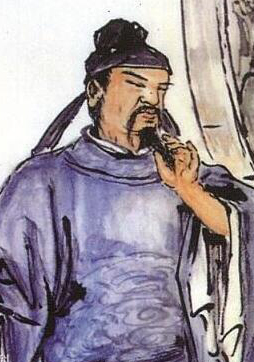晴暖不妨临石濑
香须蜂咬应知苦,斜影僧眠得占闲。
数点稀星枝上下,一痕残雪树中间。
入冬冷落愁眉结,见尔鲜明故展颜。
晴暖不妨临石濑。宋代。舒岳祥。晴暖不妨临石濑,清寒多是傍柴关。香须蜂咬应知苦,斜影僧眠得占闲。数点稀星枝上下,一痕残雪树中间。入冬冷落愁眉结,见尔鲜明故展颜。
《梅花二首遗正仲少见折赠之意》是宋代舒岳祥所作的诗词作品。以下是对该诗词的中文译文、诗意和赏析:
晴暖不妨临石濑,
阳光明媚,无妨前来石濑边,
Clear and warm, it is worth visiting the rock-rapids,
Under the clear and warm sky, it is worth visiting the rock-rapids.
清寒多是傍柴关。
清冷多是靠近柴门,
Cold and pure, it often lingers near the firewood gate,
Cold and pure, it often lingers near the firewood gate.
香须蜂咬应知苦,
梅花的香气必定让蜜蜂叮咬而感到苦涩,
The fragrance of plum blossoms, when tasted by bees, reveals its bitterness,
The fragrance of plum blossoms, when tasted by bees, reveals its bitterness.
斜影僧眠得占闲。
斜斜的影子,僧人在其中沉睡,宽闲自在,
Slanting shadows, a monk rests within, enjoying leisure and tranquility,
Slanting shadows, a monk rests within, enjoying leisure and tranquility.
数点稀星枝上下,
几颗孤星点缀在枝条上下,
A few scattered stars dot the branches up and down,
A few scattered stars dot the branches up and down.
一痕残雪树中间。
一片残余的雪花停留在树的中央。
A trace of lingering snow rests in the midst of the tree,
A trace of lingering snow rests in the midst of the tree.
入冬冷落愁眉结,
进入冬季,荒凉寂寞,忧愁的眉头紧锁,
Entering winter, desolation and loneliness, a furrowed brow full of sorrow,
Entering winter, desolation and loneliness, a furrowed brow full of sorrow.
见尔鲜明故展颜。
看到你这鲜明的姿态,便展露笑颜。
Seeing your vibrant presence, my face lightens up with a smile,
Seeing your vibrant presence, my face lightens up with a smile.
诗词描绘了梅花的景象。首先,诗人以晴暖的天气为背景,描述了梅花盛开的场景。接着,他表达了梅花的特性,如清冷、苦涩和香气。诗人通过运用自然景物和人物描写,将梅花与僧人、星星和残雪相比较,展现了梅花的独特之处。最后,诗人以梅花的傲立和鲜明之姿,表达了对生活的积极态度和欣赏之情。整首诗以简洁明快的语言展示了梅花的傲雪凌霜、坚韧不拔的品质,同时也蕴含了诗人对生活的感悟和情感的宣泄。
舒岳祥
(1236—?)台州宁海人,字舜侯,一字景薛。理宗宝祐四年进士。仕终承直郎。尝以文见吴子良,子良称其异禀灵识,如汉之贾谊。后以文学名。宋亡不仕,避地奉化,与戴表元友善,表元之学,得力于岳祥为多。尝读书于阆风台,人称阆风先生。著述统名《阆风集》。...
舒岳祥。(1236—?)台州宁海人,字舜侯,一字景薛。理宗宝祐四年进士。仕终承直郎。尝以文见吴子良,子良称其异禀灵识,如汉之贾谊。后以文学名。宋亡不仕,避地奉化,与戴表元友善,表元之学,得力于岳祥为多。尝读书于阆风台,人称阆风先生。著述统名《阆风集》。
